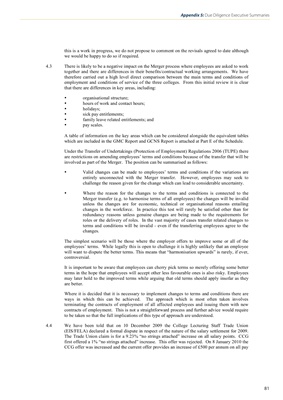
81
Appendix 5: Due Diligence Executive Summaries
this is a work in progress, we do not propose to comment on the revisals agreed to date although
we would be happy to do so if required.
4.3 There is likely to be a negative impact on the Merger process where employees are asked to work
together and there are differences in their benefits/contractual working arrangements. We have
therefore carried out a high level direct comparison between the main terms and conditions of
employment and conditions of service of the three colleges. From this initial review it is clear
that there are differences in key areas, including:
• organisational structure;
• hours of work and contact hours;
• holidays;
• sick pay entitlements;
• family leave related entitlements; and
• pay scales.
A table of information on the key areas which can be considered alongside the equivalent tables
which are included in the GMC Report and GCNS Report is attached at Part E of the Schedule.
Under the Transfer of Undertakings (Protection of Employment) Regulations 2006 (TUPE) there
are restrictions on amending employees' terms and conditions because of the transfer that will be
involved as part of the Merger. The position can be summarised as follows:
• Valid changes can be made to employees' terms and conditions if the variations are
entirely unconnected with the Merger transfer. However, employees may seek to
challenge the reason given for the change which can lead to considerable uncertainty.
• Where the reason for the changes to the terms and conditions is connected to the
Merger transfer (e.g. to harmonise terms of all employees) the changes will be invalid
unless the changes are for economic, technical or organisational reasons entailing
changes in the workforce. In practice this test will rarely be satisfied other than for
redundancy reasons unless genuine changes are being made to the requirements for
roles or the delivery of roles. In the vast majority of cases transfer related changes to
terms and conditions will be invalid - even if the transferring employees agree to the
changes.
The simplest scenario will be those where the employer offers to improve some or all of the
employees' terms. While legally this is open to challenge it is highly unlikely that an employee
will want to dispute the better terms. This means that "harmonisation upwards" is rarely, if ever,
controversial.
It is important to be aware that employees can cherry pick terms so merely offering some better
terms in the hope that employees will accept other less favourable ones is also risky. Employees
may later hold to the improved terms while arguing that old terms should apply insofar as they
are better.
Where it is decided that it is necessary to implement changes to terms and conditions there are
ways in which this can be achieved. The approach which is most often taken involves
terminating the contracts of employment of all affected employees and issuing them with new
contracts of employment. This is not a straightforward process and further advice would require
to be taken so that the full implications of this type of approach are understood.
4.4 We have been told that on 10 December 2009 the College Lecturing Staff Trade Union
(EIS/FELA) declared a formal dispute in respect of the nature of the salary settlement for 2009.
The Trade Union claim is for a 9.23% "no strings attached" increase on all salary points. CCG
first offered a 1% "no strings attached" increase. This offer was rejected. On 8 January 2010 the
CCG offer was increased and the current offer provides an increase of £500 per annum on all pay